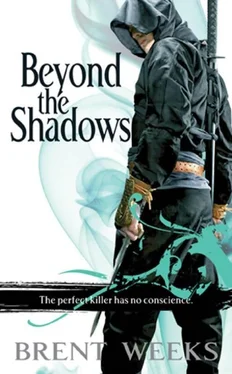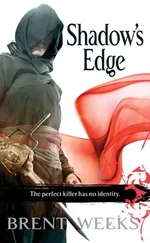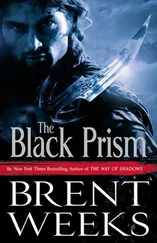“This is Ashaiah Vul,” the general said. “He was your father’s Raptus Morgi, Keeper of the Dead. I think you need to hear what he can tell you.”
“I’ve never heard of such an office,” Dorian said. And “raptus” didn’t primarily mean keeper, either. It meant taker, stealer. Dorian’s stomach turned.
“By your father’s order and his father’s before him, it was a quiet office, Your Holiness,” Ashaiah Vul said. He was utterly bald, with a knobby skull and a pinched face with nearsighted eyes, though he looked barely forty years old. “I was known only as the Keeper. Your father’s Hands discouraged questions.”
The Hands. There was another problem. Whoever led the informers, torturers, spies, and guards who served as the Godking’s thousand hands had yet to show himself. Regardless, Dorian doubted Ashaiah Vul would dare lie about them.
“Go on,” Dorian said.
“I think you may want to come with me, Your Holiness. I suggest you leave your guard here.”
Is this the first attempt on my life? If so, it was rather clumsy. That made it all the more impossible to refuse. When the attempts on Dorian’s life began, he had to defeat them ruthlessly. Then they would end. “Very well.” Dorian signaled the guards to stay and dismissed the general.
In the hall, they immediately ran into Jenine. “My lord, I’m so glad to see you,” she said, giving him a version of a Khalidoran bow mixed with a Cenarian curtsey, chin up, eyes closing demurely only for a moment, right hand sweeping into the Khalidoran courtiers’ flourish while the left hand flared her skirt as she curtsied. She made the mixed curtsey look graceful, too. Obviously she’d practiced it. It occurred to him then that there was no Khalidoran form of a woman’s salute to an equal male. Khalidoran women who were equals would nod to each other, but were always inferior to men in the same social rank, and invisible to men of lower rank. And all women prostrated themselves before a Godking. This was Jenine’s offering of a middle ground. He smiled, pleased with her solution.
Dorian nodded more deeply than any Godking before him would have. “My lady, the pleasure is mine. How may I serve you?”
“I was hoping to spend the day with you. I don’t want to be in your way. I just want to learn.”
Dorian glanced at Ashaiah Vul. The man, of course, had his eyes averted. He wouldn’t dare to disapprove of a Godking’s decisions, or to even look at a Godking’s woman. “I’m afraid I’m going to go see something remarkably unpleasant. You don’t want to see it. I don’t want to see it. You should probably wait in the throne room. I’ll be back shortly.” Dorian turned.
“I do want to see it,” Jenine interjected. Ashaiah Vul gasped at her audacity, then studied the floor once more as both of them looked at him, his face going red.
“A thousand pardons, my lord, I spoke hastily. Forgive my rudeness,” Jenine said. She chewed her lip. “I—My father never looked at things he didn’t want to see, and it got him and my whole family killed, our country laid waste. Dealing with things we don’t like is part of ruling. My father refused to do it because he was weak and venal. How else am I to learn if not from you?”
“What I’m going to see is beyond anything your father had to deal with, real or imagined,” Dorian said.
“Even so.” Jenine was unmoved, and Dorian couldn’t help but smile. He loved her strength, even as it surprised him.
“Very well,” he said. “Ashaiah, show us what you were going to show me alone. All of it.”
Ashaiah Vul said nothing, pretended to have no opinion—and maybe, in fact, had no opinion. A God-king’s unwelcome order was like a day of unwelcome weather. You might not like it, but you didn’t have any illusions that you could change it, either. So Ashaiah took them deep into the bowels of the Citadel, and then into the tunnels of the mountain itself. Dorian could smell vir on the man, though not much. He was at best a meister of the third shu’ra.
Finally, Ashaiah Vul stopped in front of a door that looked like any of the hundreds of others this deep in the Citadel. The dust in this hall was so thick it was more like soil, and it was plain that this room hadn’t been visited any more recently than any of the others. He unlocked the door and opened it.
Dorian held his vir as he followed the Lodricari into the darkness. His first sensation was that this room was huge, cavernous. The air was musty, thick, fetid.
Ashaiah mumbled an incantation and Dorian snapped three shields into place around both himself and Jenine. A moment later, light coursed up the arch where Ashaiah held his hand against the wall. It spread from arch to arch, across a painted ceiling over a hundred feet above. In a few seconds, light bathed the chamber.
This had been a library once, a place of beauty and light. The walls and pillars were the color of ivory and lace. The mural was like something out of a forgotten legend, light coming out of darkness, creation. It gave a sense of divinity and purpose. Long cherry shelves had once held both scrolls and books and tables had been arranged with space for scholars to study.
Now, it held clean, white bones. The chamber was hundreds of paces long, and half as wide, and everywhere, the books and scrolls had been removed. In their place, on every shelf, on every table, were bones. Old, old bones. Some shelves held entire skeletons, labeled with tags tied to their wrists. Some held skeletons of human bones but arranged in inhuman shapes. But mostly, the shelves held matching bones, with boxes for the small ones. An entire shelf of femurs. Boxes of finger bones. Pelvises stacked. Spines whole and in boxes for each vertebra. And skulls in a large central area: mountains of skulls.
Dorian dropped the shields. This was no attack. At least not on his body. “What is this?”
Ashaiah glanced at Jenine, then, obviously deciding he must speak the truth, said, “Should the wild men invade, this is your salvation, Your Holiness. It is your corpusarium. When General Naga speaks of the clans raising an army, this is what he means. Two years ago, a barbarian chieftain found an ancient mass grave and discovered a secret we had long thought was ours alone.”
“Raising the dead?”
“Sort of, Your Holiness.”
“Sort of?”
“The souls of men are inviolate,” Ashaiah Vul said.
“I always liked purple.”
Ashaiah blinked, not daring to chuckle. Jenine was too busy staring around in wonder. He didn’t think she even heard him. “We don’t have the power to bind men’s souls to their bodies. Your predecessors tried to make themselves immortal doing that, but it never worked well. This is different. We call it raising because we use the bones of the dead and unite them with a kind of spirit we call the Strangers. The result is the krul. They were originally called the Fallen because whenever they fall in battle, they can be raised again if a Vürdmeister is present.”
“Take me one step at a time,” Dorian ordered, his queasiness increasing.
“It starts in the pits. It always has. The Godkings have always said that the ore beneath Khaliras was powerful, and that that’s why the slaves and criminals and captured enemies are forced to work there. It’s a lie. We don’t need their service; we don’t need the ore. We need the prisoners’ bones and their agony. Their bones give us a frame. Their agony draws the Strangers.”
“What are these Strangers?” Dorian asked.
“We don’t know. Some of them have been here for millennia, but despite the length of their experiences, we are a puzzle to them. They don’t have physical bodies—though my master said that once they walked the earth, took lovers, and had children who were the heroes of old, the nephilim. The southrons claim the name was because the Strangers were once children of their One God who were thrown out of heaven.” He smiled weakly, clearly regretting saying anything about a southron religion.
Читать дальше












